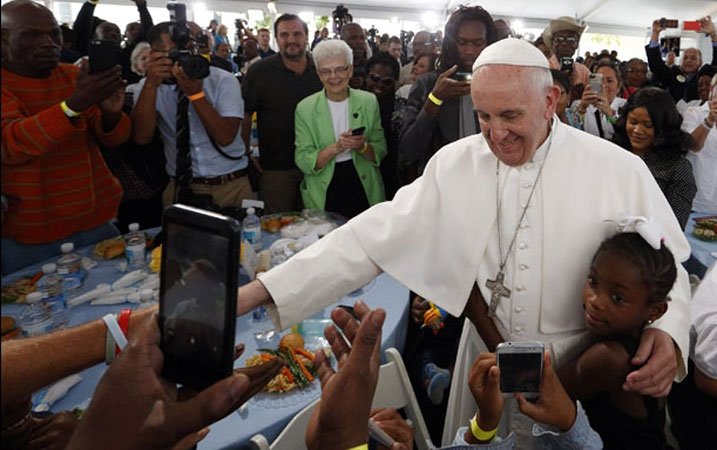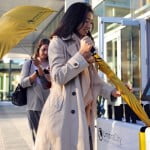The recently concluded Vatican meeting on families that brought together 270 bishops from every continent underscored the unenviable political high-wire act Pope Francis faces in achieving lasting reforms.
The fractious, three-week synod played out against the backdrop of a refreshing papacy that continues to redefine the public face of Catholicism, even as it increasingly provokes deep anxiety and even paranoia among conservatives whiplashed by the new approach the first Jesuit pope brings to the chair of St. Peter.
 The dramas in Rome included a protest letter to the pope from 13 conservative cardinals, public sniping among members of the hierarchy, and even false news reports that the pope was suffering from a brain tumor.
The dramas in Rome included a protest letter to the pope from 13 conservative cardinals, public sniping among members of the hierarchy, and even false news reports that the pope was suffering from a brain tumor.
Fissures in the American hierarchy were also on display. Cardinal Timothy Dolan of New York and Cardinal Daniel DiNardo of Houston, a high-ranking official at the US Conference of Catholic Bishops, signed the letter to the pope raising concerns about the synod’s working document and the meeting’s influential drafting committee. The fact that it was leaked to a Vatican commentator in Italy consistently critical of the pope’s reform agenda made for less than stellar optics to say the least.
Cardinal Donald Wuerl of Washington, a moderate selected by Pope Francis to be on the synod’s drafting committee, dispensed with his usual cautious style to publicly speculate if the accusations of rigging the meeting’s outcome were really more about critics who “just don’t like this pope.” There are Church leaders, he said, who view the pope’s efforts as “somewhat threatening.”
This fear that the Catholic Church is under siege from within has been a common refrain from conservative prelates and commentators. The rising angst from the right is both inevitable, given his unsparing challenges to the ecclesiastical status quo, and wildly disproportionate. Pope Francis is not tossing Church doctrine into the Tiber River, and he shares similarities with his predecessors, including their concern with economic inequality and climate change.
ADVERTISEMENT
Francis is no secular liberal. Progressives who expect him to refashion the Church in their image are as delusional as reactionaries on the right who think he is not Catholic enough.
But a pope who openly frets about “small-minded rules” in the Church and who challenges the hierarchy not to reduce the “freshness and fragrance” of the Gospel to a “disjointed multitude of doctrines” does present a stark contrast to Pope John Paul II and Pope Benedict XVI.
This posture is a welcome change for many faithful and deeply unnerving for others. After the heady and hopeful days of engagement with the modern world ushered in by the reforming Second Vatican Council (1962-1965), the Church retrenched. In its worst forms, a siege mentality took hold, privileged clericalism festered, and self-appointed watchdogs of orthodoxy demonized Catholics who were deemed insufficiently pro-life. Confident hardliners who assumed they had a monopoly on defining Catholic identity are now losing their bearings.
Under the headline, “The Plot to Change Catholicism,” New York Times columnist Ross Douthat, a conservative Catholic, blasted what he called the pope’s “ostentatious humility” and described Francis as the “chief plotter” at the synod.
“The entire situation abounds with ironies,” Douthat wrote. “Aging progressive are seizing a moment they thought had slipped away, trying to outmaneuver younger conservatives who recently thought they owned the Catholic future.”
A number of Francis’s signature priorities — desire for open debate, discernment amid complexity, putting people at the center of a pastoral theology — conflict with the cold legalism that becomes the default setting of many who view themselves as the “real” Catholics defending the faith. By rekindling the embers of Vatican II, which defined the Church as “the people of God” (as opposed to just the hierarchy) and emphasized decentralization of power and collegiality as models of Church governance, Francis is demonstrating that in many ways, his vision of reform is as much about the journey as it is the destination.
More from Crux
Jaroslaw Kaczynski, the leader of the conservative opposition Law and Justice party casts his ballot in Poland’s general elections in Warsaw, Poland on Sunday, Oct. 25. (AP Photo/Czarek Sokolowski)
As Poland moves right, Jaroslaw Kaczynski makes a dramatic comeback
Polish Prime Minister Ewa Kopacz spoke to journalists after a meeting with a group of Polish women on the last day of the parliamentary elections campaign in Warsaw, Poland, Friday, Oct. 23. (AP Photo/Alik Keplicz)
A quick look at the two main parties in Poland’s election Sunday
Pope Francis, Kelly Gissendaner and ‘unchanging faith in a changing world’
In the end, reformers and hardliners could both declare victory after the synod.
Bishops left the door open for divorced and remarried Catholics to be fully integrated into the Church though a case-by-case process that would involve private spiritual counseling with a priest. Divorced and civilly remarried Catholics, the final report notes, “must not feel excommunicated.” Conservatives, who fear allowing these Catholics to receive the Eucharist at Mass is an unacceptable violation of the Church’s teaching on the “indissolubility” of marriage, were quick to point out that the final document did not specifically reference Communion.
When it comes to how the Church should address couples that live together outside of marriage, the bishops proposed doing so in “a constructive manner” — hardly groundbreaking language — and with the goal of “leading them towards the fullness of marriage and family.”
Bishops punted on making changes in how the Church responds to same-sex couples, reiterating traditional language from the Catechism that gay people should never face “unjust discrimination,” but describing these relationships as not “even remotely analogous” to a marriage between a man and a woman.
Pope Francis will now decide how to act on the synod’s recommendations. The particulars of those decisions surely matter, but the pope has made it consistently clear that the first and most essential reform, in his words, must be a change in attitude.
Francis is trying to wake up Church leaders, tucked peacefully under the comfortable blankets of doctrine, to the more difficult task Jesus embodied. The pope wants a Church that walks into uncertainty, seeks out those on the peripheries, heals wounds, and encounters people. In his blunt speech to bishops at the end of the synod, he said the meeting had “laid bare the closed hearts which frequently hide even behind the Church’s teachings or good intentions.” He added that “the true defenders of doctrine are not those who uphold its letter, but its spirit; not ideas, but people.”
By acknowledging shades of gray and welcoming debate as healthy, the pope is humanizing the abstract and challenging an ancient institution to rediscover its roots.
“What the Holy Father has done is give us all the permission to put everything on the table and to talk about it,” Archbishop Blase Cupich of Chicago said. “And I think that’s a very healthy thing. This is the way adults work, and he is calling us to be an adult Church.”
Growing pains are inevitable. But in helping the Church stretch, Francis is also securing its future.
[“source-cruxnow”]




